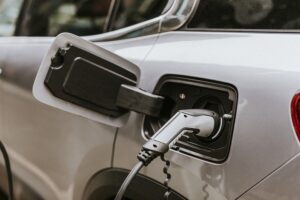Insurance for EVs Presents New Challenges for the Industry
Auto insurance for EVs can be expensive and tricky. But with the right tips and advice from an experienced agent, it’s a challenge that can be overcome.
Whether to fight climate change or just avoid paying the out of control gas prices, electric vehicles (EVs) are becoming increasingly popular. With their eco-friendly credentials and impressive performance, EVs have captured the imaginations of many car shoppers while allowing them to drastically reduce the cost of getting around. However, their unique features also pose new challenges for the insurance industry including new equipment and technology.
The Growing Popularity of Electric Cars
Electric cars have witnessed an unprecedented surge in popularity over the past decade. Factors such as environmental concerns, government incentives, and advancements in battery technology have made EVs more accessible and appealing to consumers. This surge in popularity is expected to continue, with many auto manufacturers committed to electric-only or predominantly electric lineups in the coming years.
Insuring the Future
As electric cars become more commonplace, insurers are confronted with a changing automotive landscape. Insurance for EVs differs in several key ways from traditional internal combustion engine (ICE) vehicles.
- Unique Components and Repair Costs: Electric vehicles feature distinct components such as lithium-ion batteries and complex electric drivetrains. These components can be expensive to repair or replace. Insurers need to account for these differences when calculating premiums and assessing the overall risk.
- Safety Features: Electric cars are often equipped with advanced safety features, including autonomous driving capabilities and collision avoidance systems. These features can reduce accident frequency, potentially leading to lower insurance premiums for EV owners.
- Higher Repair Costs: Since EVs are relatively new, replacement parts are harder to come by as the aftermarket suppliers and even the manufacturers have not had time to spin up their production of replacement parts. Additionally, many newer EV companies’ models are so new that repair facilities are not prepared to handle the repairs on them.
- Charging Infrastructure: The availability of charging infrastructure is crucial for EV owners. Insurers may need to consider the proximity of charging stations when assessing risk, as running out of charge can result in more claims for emergency road services.
Challenges in Insuring Electric Cars
While there are many advantages to insuring electric cars, several challenges must be addressed:
- Data Collection and Analysis: Insurers need to collect and analyze data on electric vehicle performance, including battery degradation, to accurately assess risk and set premiums.
- Repair Costs: As EVs become more complex, repair costs can be higher. Ensuring access to qualified repair facilities and affordable replacement parts is crucial.
- Underwriting Accuracy: Accurately underwriting EVs is essential to determine fair premiums. This may require a deeper understanding of the technology and its associated risks.
- Residual Value: Predicting the future value of electric cars is challenging due to rapid technological advancements. This can impact policies related to vehicle depreciation and replacement value.
- Operator Error: As EVs become more autonomous, it is important for drivers to understand that those technologies are FAR from perfect. Drivers must remain alert and aware of dangers and not become too complacent behind the wheel.
Smart Cars Need Smart Insurance
As companies become more familiar with claim costs for EVs, wide differences have developed between companies. Finding an agent with options is more important than ever. Independent agents that represent multiple companies stand a much better chance of getting a better rate on your particular vehicle than agents that only represent one company.
Also, annual mileage is more important than ever in determining insurance costs. To the extent possible, try to spread your driving across all of your vehicles. For example, if you have a short commute but your spouse drives further to work, try trading off cars to even out the mileage. Or let the longer commute driver drive the electric but put your extra miles such as vacation driving on the car that’s normally driven less. This way, you can try to keep the annual mileage lower on the more expensive to insure EV.
Enjoying Driving Your Electric Car
Regardless of your reasons, electric vehicles appear to be here to stay and can be a fun and sensible way to reduce your costs. While, depending on the car your choose, insurance costs may be a bit higher, the savings you’ll realize using electricity instead of gasoline will really add up.